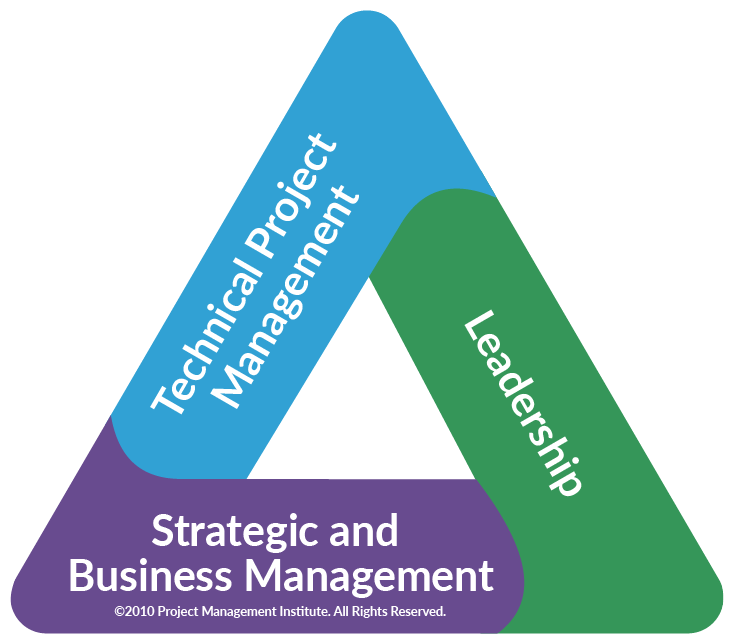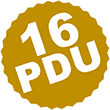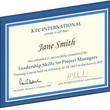The onsite event registration is at the KTC Registration Desk, in front of the entrance to the conference room, located on the main convention floor of the hotel. Please follow the signs from the lobby to the convention floor.

Focusing on the Successful Delivery of Project-Based Work in Post-Covid 2022 and Beyond, this 2-day practical workshop helps Project Managers and their Organizations understand the impact of Covid19 on the delivery of Project-Based Work and How to Continue To Deliver Profitable Projects and To Retain Satisfied Customers.
In particular, this course will help you gain key skills in:
 This workshop awards 16 PDUs to PMP® certified and other PMI® credential holders
This workshop awards 16 PDUs to PMP® certified and other PMI® credential holders
| CREDENTIAL | PMP® | PgMP® | PfMP® | PMI-ACP® | PMI-PBA® | PMI-RMP® | PMI-SP® |
| Technical Project Management | 6 | 2 | 2 | 4 | 0 | 4 | 2 |
| Strategic & Business Management | 6 | 6 | 6 | 6 | 6 | 6 | 6 |
| Leadership | 4 | 4 | 4 | 4 | 4 | 4 | 4 |
| PDU Total | 16 | 12 | 12 | 14 | 10 | 14 | 12 |
Dear participant,
I am very excited to welcome you to my latest training course, which I have been developing over the last 2 years, encompassing some of the very best practices from dozens of companies and hundreds of people I have been working with, during the Covid19 pandemic.
After more than 20 years of deliverring PM workshops all around the World, I am always excited to go back to Zagreb, where I have delivered some of the most memorable events of my career.
I am looking forward to meeting you on APRIL 25th!
Warm regards,
Rick Graham, PhD, PMP, PMI-ACP
Founder and Managing Director
Graham & Partners


The onsite event registration is at the KTC Registration Desk, in front of the entrance to the conference room, located on the main convention floor of the hotel. Please follow the signs from the lobby to the convention floor.

SESSION 1: Defining the Content
In this short introductory session, your Workshop Leader will outline the content and the agenda of the 2-day course.
· Why is This Important?
· The Acceleration of Change
· Volatility, Uncertainty, Complexity and Ambiguity in Practice
· Stress-testing in the Covid-19 World and Beyond
· The Growing Importance of Resilience
· The 6 Key Trends in the Delivery of Project-Based Work
SESSION 2: Closing The Connection Between Projects And Strategy
Traditionally, project management is seen as an organizational tool used to work toward and achieve success in discrete initiatives, with the project manager responsible for shepherding the project to a successful conclusion.
However it has become increasingly evident that for the organization to be successful, projects must be linked to the realization of benefits, and there must be close alignment between projects and programs and corporate strategic objectives. Organizations that do not do this well end up with multiple poorly aligned projects, often driven by local considerations, and often without objective benefit.
For organizations to be successful in the increasingly complex and competitive world, it is essential that project and program managers are able to understand corporate strategy and to be able to execute the strategy by translating it into project work aimed at achieving it. Current trends are to ensure not only a joined-up mentality, but also the processes and tools to allow this to happen in practice. Without such integrated thinking, organizations are likely to eventually fail.
Key Take-Aways from this Session:
· Why is This Important?
· What is Strategy?
· The Importance of Joined-Up Thinking
· Analyzing & Framing for Alignment
· Planning for Benefits Realization
· Aligning Work with Strategy
· What Tools?
>>> Coffee & networking breaks are provided between sessions <<<

A great opportunity to engage in a casual chat with Rick Graham and your fellow delegates. Lunch will be served at the main hotel restaurant, providing a variety of specialties ranging from traditional Croatian specialities to best international cuisine.

SESSION 3: Leadership In The New Collaborative World
A recent PMI ‘Pulse of the Profession’ reported that most organizations value leadership skills as highly as technical project management skills, a trend reflected in the outline for the new PMP exam launched in January 2021.
Indeed, given that the principle features of complex projects are accepted as being multiple stakeholders, and ambiguity of requirements, features and resources, it is evident that sophisticated communication skills are required to deliver such projects successfully. These skills include the management of multiple and sometimes conflicting stakeholder expectations, as well as managing internal resources, with all the negotiation, problem solving, communication and influencing skills that this requires.
This session will examine the skills that are considered indispensable in such an environment.
Key Take-Aways from this Session:
· Why is This Important?
· A New and Evolving Form of Leadership
· Planning for Collaboration
· The Old and the New Skills of Leadership
· Leadership in the VUCA World
· Continuous Improvement and the Team
· What Tools?
SESSION 4: Risk In The Face Of ‘Unknowable’ Risks
There is no doubt that effective risk management is a critical component of successful project management, however the key trend has been the expansion of the scope of such risk management, and the sophistication of the processes and tools used. From the scope perspective, risk now includes not only all forms of uncertainty (in contrast with the limited scope of ‘risk-register-event’ risk, but extends to the delivery of business benefits through program management, and the delivery of strategic objectives through portfolio risk management. It also extends to the realization that some risks are not only ‘unknown’ but indeed ‘unknowable’. In the face of such challenges organizations must build resilience in the form of specific contingencies, planned flexibility and delegated authorities.
Furthermore the trend is to a greater degree of sophistication in terms of the processes and tools used, simple ‘risk-register’ analysis becoming increasingly seen as too limited in nature.
Key Take-Aways from this Session:
· Why is This Important?
· The Spectrum of Uncertainty
· Why the Risk Register is not Sufficient
· Horizontal & Vertical Alignment of Risk Management
· Managing ‘Unknowable’ Risks
· Building Project and Organizational Resilience
· What Tools?
>>> Coffee & networking breaks are provided between sessions <<<


Your instructor will briefly reflect on the key learning points of Day 1 and outline the goals for the Day 2.

SESSION 5: Importance Of Change Management To Project Success
During 2019, one study showed that 93% of organizations were currently undergoing some type of corporate change. These may be small adjustments, or may represent a complete overhaul of the company’s structure. There is little doubt that Covid19 has caused even the remaining 7% to consider changes in the light of such substantial external pressure.
The traditional view is that project managers should seek to minimize (or at least rigorously control) changes within their projects, however it should be recognized that in many cases the project manager is also being asked to control the organizational changes caused by the project itself. The project manager may therefore need not only a new set of tools to manage in such an environment, but also a new mindset if changes are to be properly implemented.
Indeed, even the principle that project changes should be minimized is coming under scrutiny, as the environment into which the project is to be implemented may be under constant change. The right changes must be made for the project to be successful. This may engender the use of new ways of working, such as hybrid approaches.
Key Take-Aways from this Session:
· Why is This Important?
· Change as the New Normal
· The New Approach to Change
· The Project Manager as Change Leader
· People & Change
· What Tools?
SESSION 6: Agility & Hybrid Project Management Approaches
Not so long ago, and in the linear world of ‘predictive’ projects, many organizations relied on traditional ‘S-curve’/ Waterfall type approaches to all their projects. In recent surveys however, more than 50% of organizations report using newer ‘agile’ methodologies or hybrid approaches at least in some of their projects. Indeed even amongst ‘non-information’ organizations, project teams have embraced more ‘adaptive’ methods. Or at least certain components from them.
Significant advantages accrue from the use of adaptive approaches, or at least some of their best practices, in certain types of project. However new challenges have arisen in that there is no ‘one-size-fits-all’, but on the other hand there are risks in allowing flexibility in the absence of proper control. The course will examine current trends, looking at what does and does not works well, and importantly allowing participants to create strategies to optimize their project management approaches.
Key Take-Aways from this Session:
· Why is This Important?
· Bridging the Gap from Predictive to Agile
· Selecting the Right Lifecycle
· Best Practices
· Flexibility vs Control
· What Tools?
>>> Coffee & networking breaks are provided between sessions <<<

A great opportunity to engage in a casual chat with Rick Graham and your fellow delegates. Lunch will be served at the main hotel restaurant, providing a variety of specialties ranging from traditional Croatian specialities to best international cuisine.

SESSION 7: Advanced PM Tools And Analytics
For simple linear projects, traditional measurements of Scope, Quality, Cost, Schedule, Earned Value and so on should tell us managers all they need to know. However in a world of hybrid approaches, ambiguity and complexity of requirements and delivery, and where projects may be large and dispersed, it is much harder to assess status and trend. What data is being used? How representative is it? Who is measuring it and how? Does it reflect current status and trend?
This course will assess the challenges in ensuring that metrics reflect the reality of the situation, and look at some of the more advanced analytics now being successfully used.
Key Take-Aways from this Session:
· Why is This Important?
· Level 1: Descriptive Project Data Analytics
· Ensuring Effective Use of Level 1 Tools
· Level 2: Predictive Project Data Analytics
· Choosing Level 2 Tools
· Level 3: Prescriptive Project Data Analytics
· Tools for Horizontal and Vertical Integration
SESSION 8: Closing & Re-Cap
· Guidelines for Where to Next?
>>> Coffee & networking breaks are provided between sessions <<<


Founder and Managing Director · Graham & Partners
Rick Graham has been involved in projects for over 25 years. He has been active with a wide range of industries, including pharmaceuticals, chemicals, engineering and manufacture, construction, information systems and telecommunications and has held senior roles in Astra Pharmaceuticals, Eli Lilly, IMC and British Alcan.
Rick has a special interest in the risk and recovery aspects of projects, as well as in project contracting. He teaches a module of the MBA and Operational Research courses of a major UK business. Rick is a certified Project Management Professional® by PMI® and is a member of PMI’s Risk Management Special Interest Group.
Rick is a popular key-note speaker and course facilitator on the number of project management topics, including Risk, Governance, Financial Aspects and Recovery of Projects, as well as Program & Portfolio Management, Hybrid Approach and Advanced PM Techniques & the latest best-practices in the field.
His recent assignments include delivering project consultancy and management training work for British Telecom, Deutsche Telecom, BP, Bechtel Corporation, Dubai Construction Authority, Vodafone, Siemens, Skanska, Tetrapak, Microsoft, Nokia, Ericsson, Gazprom and Intesa Sanpaolo Group among others. Rick is also a certified lawyer and certified public accountant in the UK.
Rick is well-known to PMI communities in his home country of UK, Belgium, Finland, Germany, the Netherlands, Norway, Sweden, Switzerland and the US. He's also actively presenting in Middle East, Central & Eastern Europe, and the far-flung places of the African continent; and as of recently Australia. Throughout past years he has been active as regular presenter on PMI Annual gatherings, delivering several world-class workshops.
KTC International is a training & consulting firm, specializing in bringing leading international speakers to cities across EMEA. Our events aim to help delegates and their organizations to achieve strategic goals by proper implementation of project management tools & techniques, smooth business change and use of technology.
People presenting at our events are those who set the global standards and include coveted PMI Global Congress speakers, such as Dr. Prasad Kodukula, Karl Muenchow, Liam Dillon, Dr. Richard Graham or Roger Burlton, among many others.
KTC International was established in 2003 with headquarters in Budapest, Hungary. With a track-record spanning over 18 years, we have been instrumental in organizing over 500 different congresses, conferences, forums, round-tables, seminars, workshops and specialized in-house events, that gathered more than 10,000 people in total.
For more information visit: www.ktc-international.hu

Yes, this workshop is globally accredited and provides 16 PDU points. For the PMP credential holders, the PMI Talent Triangle PDU distribution is:
Technical Project Management: 6
Strategic & Business Management: 6
Leadership: 4
This seminar is interactive and highly pragmatic, designed as combination of
Short presentations grouped in 4 half-day sessions over the course of 2 days
Practical, hands-on exercises and discussions with the audience, after each session
All registration fees are gross and no additional taxes or hidden charges shall be applied. The registration fee covers the following items:
Participation in all sessions
Lunch
Snacks & refreshments
All course materials
Electronic copy of all presentation slides and other media, sent immediatelly after the event
Certificate of Attendance, awarding 16 PDUs to PMI credential holders
Yes, 25% for 4 participants. Click on DOWNLOAD PDF REGISTRATION FORM button above for details.
Congress Center Antunovic
Zagrebacka avenija 100 A,
10090 Zagreb, Croatia
+385 (0) 1 2041 121